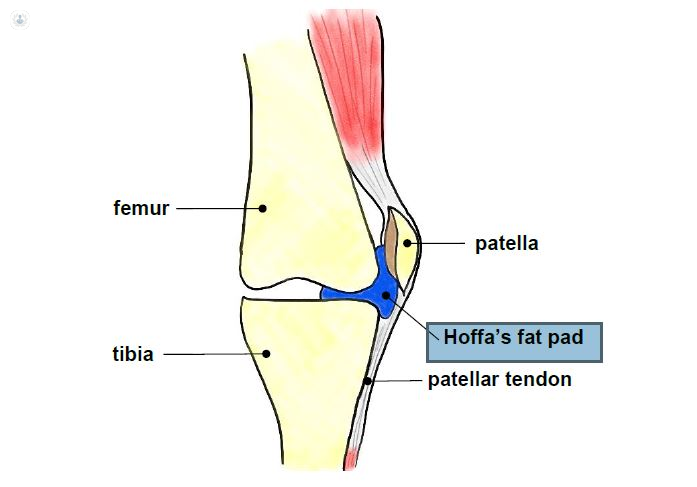Hoffa’s syndrome: what is fat pad impingement?
Written by:Many injuries can befall the knee. Hoffa’s syndrome is one potentially painful issue that involves the pad of fatty tissue under the knee cap. Innovative trauma and orthopaedic surgeon Mr Arjuna Imbuldeniya is here to explain.
What is the function of the infrapatellar fat pad?
The infrapatellar fat pad - also known as Hoffa’s fat pad - is a pad of fatty tissue at the front of the knee, situated behind the patellar tendon and below and behind the kneecap (patella). It is attached to the knee cartilage (menisci) at the front of the knee.
Hoffa’s fat pad is a normal part of human anatomy, and acts as a shock-absorber to cushion the patella and stop it from hitting off the femur (thigh bone) in the event of a direct blow to the front of the knee. The fat pad has an excellent nerve supply, therefore injury or damage to it can cause significant pain.
What is fat pad impingement?
Hoffa’s fat pad impingement, also known as Hoffa’s syndrome, is one of the leading causes of pain at the front of the knee (anterior knee pain), caused by inflammation of the fat pad. The fat pad can become inflamed if it is squashed between the femur and patella (impinged) or damaged, which can occur as the result of direct trauma or repeated aggravating movements. Once the fat pad swells, it is more prone to further injury or impingement: this is a vicious cycle which is difficult to break.
Symptoms of Hoffa’s fat pad impingement include:
- Pain, tenderness and swelling around the kneecap and around the sides of the patellar tendon – this is often difficult to localise exactly.
- The onset of the pain is usually insidious, rather than sudden.
- Increased pain upon straightening the knee (knee extension), squatting, standing for long periods, or going up stairs.
Learn more about causes of knee pain
Who is more prone to Hoffa’s syndrome?
Groups of people who are more prone to Hoffa’s fat pad impingement include those:
- With ACL injuries, which make the knee more unstable and therefore the fat pad more prone to being ‘pinched’.
- With hyperextension at the knee joint (where the knee is at more than 180° when held straight), hypermobility or excessive pronation (flat feet).
- At increased risk of sustaining a direct blow to the knee, such as athletes (footballers, rugby players, gymnasts, dancers, etc.) or in certain other occupations.
- Who perform activities such as skiing or running regularly: these activities put increased pressure at the front of the knee.
- With iliotibial band syndrome.
ACL injuries: everything you need to know
Why is Hoffa’s syndrome difficult to diagnose?
Although a very common cause of knee pain, Hoffa’s fat pad impingement is often mis- or undiagnosed, with many patients simply being told they have ‘anterior knee pain’, which does not address the underlying problem.
Doctors, physiotherapists or osteopaths may perform ‘Hoffa’s test’ to try and diagnose Hoffa’s fat pad impingement. During this test, you lie down with a bent knee and slowly straighten your leg whilst the doctor/therapist presses down just below the knee cap, either side of the patellar tendon, to try and reproduce your pain.
However, Hoffa’s test is not very precise or specific, and in order to obtain a proper diagnosis, you should see an orthopaedic consultant specialising in knee surgery.
Does Hoffa’s syndrome require treatment or will it go away on its own?
Resting your knee and avoiding movements which aggravate your pain is always recommended in the first instance if you are suffering from Hoffa’s fat pad impingement, as is using ice to help to reduce any inflammation.
However, Hoffa’s syndrome will not usually disappear without intervention, and symptoms tend to recur when patients go back to their usual activities.
Therefore, if you are suffering from Hoffa’s fat pad impingement you should consult with a knee specialist who can go through treatment options with you – this may include injection of steroids into the area to reduce inflammation (some patients require up to three over a period of time), targeted physiotherapy or simple keyhole surgery to trim or remove some of the inflamed fat pad.
Mr Imbuldeniya is a fellowship-trained consultant orthopaedic surgeon who works in central and west London, and specialises in treating patients with knee problems. He sees lots of patients with Hoffa’s fat pad impingement, and is able to assess and treat this underdiagnosed condition quickly and effectively.
Mr Imbuldeniya uses advanced coblation technology (a low-heat technology which precisely removes tissue without damaging surrounding structures) to remove any impinging tissue safely and quickly via minimally-invasive keyhole surgery, in order to get his patients back to fitness as soon as possible.
If you are suffering from symptoms that sound like they could be Hoffa’s fat pad impingement, you can book an appointment with Mr Imbuldeniya here.



